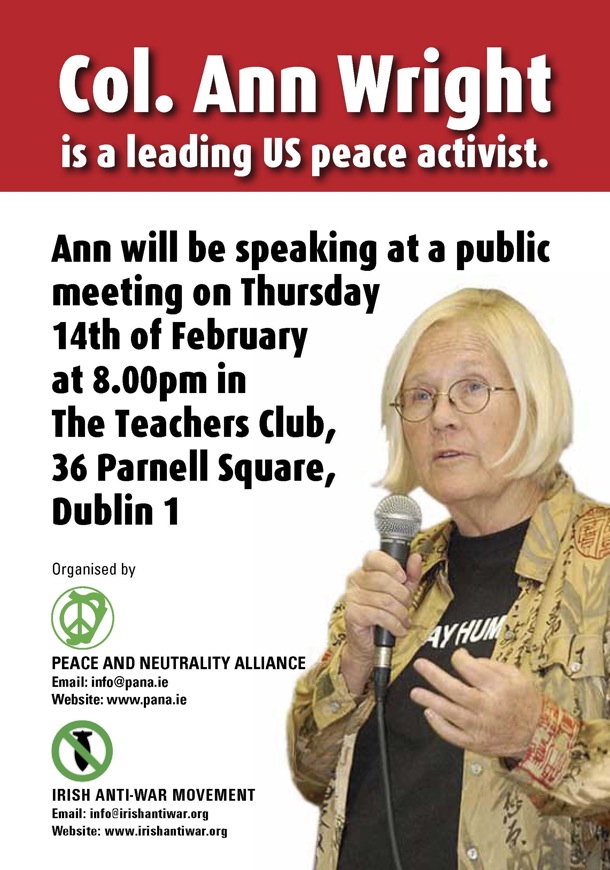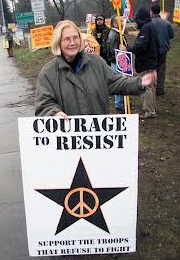5 February 2013
US Army colonel and State Department diplomat turned peace activist in Dublin

Ann Wright was proud to represent America but, on 13 March 2003, the eve of the US invasion of Iraq, Colonel Ann Wright sent a letter of resignation to then Secretary of State Colin Powell
A COLONEL in the US Army for 13 years who was also a State Department diplomat in Nicaragua, Somalia, Uzbekistan and Sierra Leone will be speaking at a meeting in the Teachers’ club in Dublin on Thursday 14 February (8pm) as a guest of the Peace and Neutrality Alliance (PANA) and the Irish Anti-War Movement (IAWM).
Ann Wright grew up in Bentonville, Arkansas, and attended the University of Arkansas, where she earned a Master’s and a Law Degree. She also has a Master’s Degree in National Security Affairs from the US Naval War College.
In her junior year at the University of Arkansas, she attended a three-week army training programme after meeting with a visiting army recruiter. That experience helped inform her decision to join the service.
For 13 years, Ann Wright was an active duty soldier. She spent another 16 years in the Army Reserves, retiring as a colonel. Part of her army work was special operations in civil affairs. After Ann Wright was released from active duty she joined the State Department.
For the next 16 years she served as a foreign diplomat in countries such as Nicaragua, Somalia, Uzbekistan, and Sierra Leone. She was on the team that reopened the US Embassy in Kabul, Afghanistan, in December 2001 after the fall of the Taliban to US forces.
In all those years, Ann Wright was proud to represent America. However, on 13 March 2003, the eve of the US invasion of Iraq, Colonel Ann Wright sent a letter of resignation to then Secretary of State Colin Powell. She felt that, without the authorisation of the UN Security Council, the US invasion and occupation of an oil-rich, Arab Muslim country would be a disaster. Only two other State Department officials resigned at that time in protest of the imminent invasion.
In a statement at the time, Colonel Wright said:
“I have served my country for almost 30 years in some of the most isolated and dangerous parts of the world. I want to continue to serve America. However, I do not believe in the policies of this administration and cannot – morally and professionally – defend or implement them. It is with heavy heart that I must end my service to America and therefore resign.”
In an interview, Colonel Wright explained that, in the Foreign Service:
“Your job is to implement the policies of an administration. If you strongly disagree with any administration’s policies, and wish to speak out, your only option is to resign. I understood that and that’s one of the reasons I resigned – to give myself the freedom to talk out.”
 Since
resigning, patriotism for Ann Wright meant becoming an anti-war activist. She worked
with Cindy Sheehan, organising Camp Casey, and appeared in the documentary Uncovered: The Truth About the Iraq War.
Since
resigning, patriotism for Ann Wright meant becoming an anti-war activist. She worked
with Cindy Sheehan, organising Camp Casey, and appeared in the documentary Uncovered: The Truth About the Iraq War.
She travels and lectures on foreign policy issues. She has been arrested five times in one year for protesting Bush’s policies, and has referred to herself cheerfully as “a felon for peace”.
This retired army colonel has also recently been temporarily banned not only from two military bases for placing postcards there announcing a showing of the documentary Sir, No Sir but from the US Capitol area (her case is still pending), and the National Press Club (this a lifetime ban), for voicing opinions and questions concerning Bush administration policies and the Iraq war.
Follow us on Facebook
An Phoblacht on Twitter
Uncomfortable Conversations

An initiative for dialogue
for reconciliation
— — — — — — —
Contributions from key figures in the churches, academia and wider civic society as well as senior republican figures





